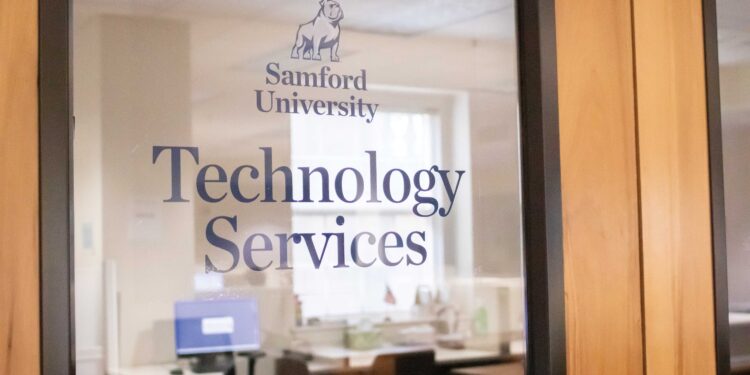October is cybersecurity awareness month. Cybersecurity is the act of protecting networks, devices and data from anyone that steals information.
At Samford, the goal of cybersecurity is that “Samford operates as securely as possible to meet the business’ needs,” said Andrew Potter, senior information security analyst under Samford Technology Services.
This department ensures that the University, faculty and students function securely, without spam, viruses, or stolen information getting in the way.
“As a student, you may not think that you have a lot to protect,” said Brian Stanley, a security analyst. “But the truth is, you do. Your identity, your name, your Social Security number, your address, your phone number, all those things are easily taken by marketers.”
Stanley and Potter emphasized how all of this information can be gathered together and used in harmful ways in the future, when students may have more assets to protect.
One way Samford increases security is through using multi-factor authentication when signing into accounts. Samford uses DUO Push to accomplish this. Although multi-factor authentication can be inconvenient to use every time one signs into their Samford account, Stanley and Potter cited it as the best way to protect information.
“So beyond just the Samford accounts, we would encourage people to add multi-factor authentication to every sort of account you have,” Stanley said.
Before Duo Push was implemented in 2018, it was a regular occurrence for student’s accounts to be compromised and send spam emails to the entire University. Now, the number of times that this happens has dropped dramatically.
“It’s really best practice to put that (multi-factor authentication) on every type of account because like I said, passwords unfortunately just aren’t enough anymore,” said Potter.
The “big three” practices that Potter recommends every student put in place to protect one’s digital information, is first, to not reuse any passwords. Instead, he recommends using a password manager that is protected by one password that you remember. He does not recommend using password managers provided by web browsers, since they are not protected by the master password.
The second practice they recommend is to use a long and complicated password. It’s also recommended to use a phrase instead of a singular word, since it will be easy to remember, but hard to crack.
The last practice Potter recommends is to put multi-factor authentication on every account one owns, from bank accounts to streaming services.
Samford Technology services also assist students through their Service desk, located in the basement of the Davis Library. At the desk, they can support any software, such as Canvas, can assist with viruses one may have, and can help with password resets if an account is compromised.
Finally, Potter and Stanley also recommend backing up all data. For Samford students and faculty, this an easily be done on Microsoft OneDrive, which is available to all students.
Samford Technology Services can be contacted at support@samford.edu .

News Editor






